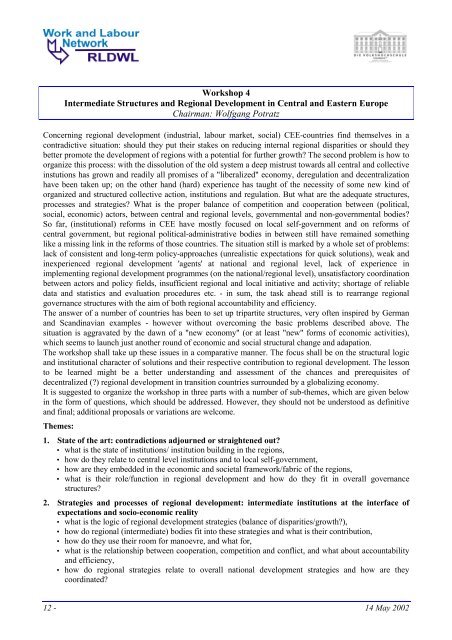"Labour, Globalisation and The New Economy" - rldwl
"Labour, Globalisation and The New Economy" - rldwl
"Labour, Globalisation and The New Economy" - rldwl
Create successful ePaper yourself
Turn your PDF publications into a flip-book with our unique Google optimized e-Paper software.
Workshop 4<br />
Intermediate Structures <strong>and</strong> Regional Development in Central <strong>and</strong> Eastern Europe<br />
Chairman: Wolfgang Potratz<br />
Concerning regional development (industrial, labour market, social) CEE-countries find themselves in a<br />
contradictive situation: should they put their stakes on reducing internal regional disparities or should they<br />
better promote the development of regions with a potential for further growth? <strong>The</strong> second problem is how to<br />
organize this process: with the dissolution of the old system a deep mistrust towards all central <strong>and</strong> collective<br />
instutions has grown <strong>and</strong> readily all promises of a "liberalized" economy, deregulation <strong>and</strong> decentralization<br />
have been taken up; on the other h<strong>and</strong> (hard) experience has taught of the necessity of some new kind of<br />
organized <strong>and</strong> structured collective action, institutions <strong>and</strong> regulation. But what are the adequate structures,<br />
processes <strong>and</strong> strategies? What is the proper balance of competition <strong>and</strong> cooperation between (political,<br />
social, economic) actors, between central <strong>and</strong> regional levels, governmental <strong>and</strong> non-governmental bodies?<br />
So far, (institutional) reforms in CEE have mostly focused on local self-government <strong>and</strong> on reforms of<br />
central government, but regional political-administrative bodies in between still have remained something<br />
like a missing link in the reforms of those countries. <strong>The</strong> situation still is marked by a whole set of problems:<br />
lack of consistent <strong>and</strong> long-term policy-approaches (unrealistic expectations for quick solutions), weak <strong>and</strong><br />
inexperienced regional development 'agents' at national <strong>and</strong> regional level, lack of experience in<br />
implementing regional development programmes (on the national/regional level), unsatisfactory coordination<br />
between actors <strong>and</strong> policy fields, insufficient regional <strong>and</strong> local initiative <strong>and</strong> activity; shortage of reliable<br />
data <strong>and</strong> statistics <strong>and</strong> evaluation procedures etc. - in sum, the task ahead still is to rearrange regional<br />
governance structures with the aim of both regional accountability <strong>and</strong> efficiency.<br />
<strong>The</strong> answer of a number of countries has been to set up tripartite structures, very often inspired by German<br />
<strong>and</strong> Sc<strong>and</strong>inavian examples - however without overcoming the basic problems described above. <strong>The</strong><br />
situation is aggravated by the dawn of a "new economy" (or at least "new" forms of economic activities),<br />
which seems to launch just another round of economic <strong>and</strong> social structural change <strong>and</strong> adapation.<br />
<strong>The</strong> workshop shall take up these issues in a comparative manner. <strong>The</strong> focus shall be on the structural logic<br />
<strong>and</strong> institutional character of solutions <strong>and</strong> their respective contribution to regional development. <strong>The</strong> lesson<br />
to be learned might be a better underst<strong>and</strong>ing <strong>and</strong> assessment of the chances <strong>and</strong> prerequisites of<br />
decentralized (?) regional development in transition countries surrounded by a globalizing economy.<br />
It is suggested to organize the workshop in three parts with a number of sub-themes, which are given below<br />
in the form of questions, which should be addressed. However, they should not be understood as definitive<br />
<strong>and</strong> final; additional proposals or variations are welcome.<br />
<strong>The</strong>mes:<br />
1. State of the art: contradictions adjourned or straightened out?<br />
what is the state of institutions/ institution building in the regions,<br />
how do they relate to central level institutions <strong>and</strong> to local self-government,<br />
how are they embedded in the economic <strong>and</strong> societal framework/fabric of the regions,<br />
what is their role/function in regional development <strong>and</strong> how do they fit in overall governance<br />
structures?<br />
2. Strategies <strong>and</strong> processes of regional development: intermediate institutions at the interface of<br />
expectations <strong>and</strong> socio-economic reality<br />
what is the logic of regional development strategies (balance of disparities/growth?),<br />
how do regional (intermediate) bodies fit into these strategies <strong>and</strong> what is their contribution,<br />
how do they use their room for manoevre, <strong>and</strong> what for,<br />
what is the relationship between cooperation, competition <strong>and</strong> conflict, <strong>and</strong> what about accountability<br />
<strong>and</strong> efficiency,<br />
how do regional strategies relate to overall national development strategies <strong>and</strong> how are they<br />
coordinated?<br />
12 - 14 May 2002


